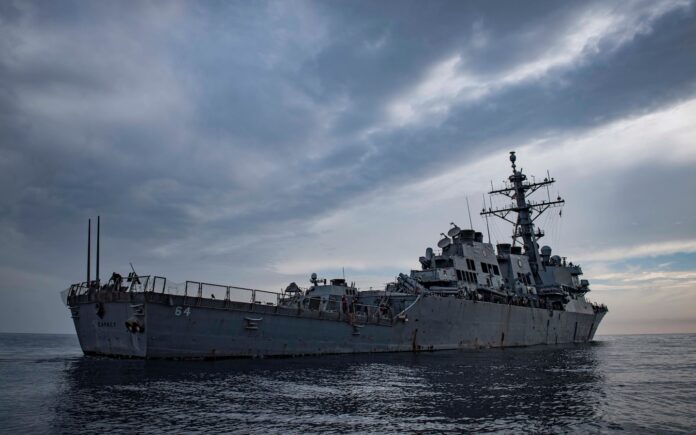The incidents have involved U.S. troops in Iraq and Syria and aboard a Navy destroyer in the Red Sea, said Brig. Gen. Patrick Ryder, a Pentagon spokesman. Speaking at a news conference, he said the spate of action entailed three attack drones targeting U.S. military positions in Iraq on Tuesday, two drones zeroing in on a garrison in Syria on Wednesday, and the downing by personnel on the USS Carney of cruise missiles and drones launched by Iranian-backed fighters, possibly aimed at Israel.
“Our defensive response was one that we would have taken for any similar threat in the region where we’re able to do so against our interests, personnel and partners,” Ryder said.
Coalition personnel suffered what Ryder said were minor injuries in the attacks targeting Iraq and Syria. In a separate incident, U.S. personnel took shelter at Ain Al-Asad air base in western Iraq on Wednesday after an early-warning alert system sounded. No drone struck the base then, Ryder said, but a contractor working on the base died after suffering cardiac arrest amid the commotion.
Taken together, the burst of activity raised the specter of renewed hostility directed against U.S. personnel across the region as outrage swells over Israel’s campaign of airstrikes and plans for a ground offensive in the Gaza Strip following the brutal cross-border attack by the militant group Hamas that left hundreds of civilians dead.
In recent days, a range of Iranian-backed groups have called on members to target Israel’s allies, including the United States, if they support Israel’s war in Gaza. Those groups include both the Houthis in Yemen and militias in Iraq and Syria.
Ryder described the attacks in Iraq and Syria this week as “small-scale” but “concerning and dangerous.” The Pentagon maintains a presence of about 2,500 U.S. troops in Iraq and another 900 in Syria, assessing they are necessary to prevent a resurgence in the Islamic State group. Those personnel have been attacked with drones, rockets and other weapons periodically in recent years, with the Pentagon typically attributing the violence to Iranian-backed militias.
Iran has provided weapons and training to Hamas, the Houthis and Hezbollah, a militant group based in Lebanon, but Ryder indicated that, thus far, the United States has no evidence directly linking Tehran to the most recent incidents.
“Right now, I think you have to look at these individually,” Ryder said. “We’re taking them seriously, we’re responding appropriately, obviously, in ensuring that our forces are protected. But again, our focus is on deterring a broader regional conflict, and right now this conflict is contained between Israel and Hamas.”
The Carney, the destroyer involved in the shoot-downs Thursday, is part of the USS Gerald R. Ford Carrier Strike Group, which Defense Secretary Lloyd Austin ordered into the eastern Mediterranean Sea after the Hamas attack. It transited through the Suez Canal, according to a social media post from the Navy, placing it in the Red Sea south of Israel.
The Pentagon has said that it will deploy additional ships to the region, including the USS Dwight D. Eisenhower Carrier Strike Group and its associated escort ships. The carrier groups comprise about 7,500 troops each.
A three-ship amphibious task force of more than 4,000 sailors and Marines also is in the region, with one of the vessels, the USS Mesa Verde, in the Mediterranean close to Israel.
The other two, the USS Bataan and USS Carter Hall, were in the Gulf of Aden on Thursday, Ryder said. They are making their way to Israel. The 26th Marine Expeditionary Unit, an embarked force of more than 2,000 Marines and sailors, is trained for a wide range of missions, including embassy evacuation.



